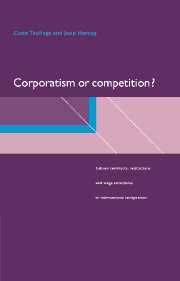 Corporatism or Competition?
Corporatism or Competition? Published online by Cambridge University Press: 23 November 2009
In 1992 Dr Gerard de Vries, of the Dutch Ministry of Social Affairs and Employment, called us and asked if we would be interested in doing a study on wage formation. The on-going debate in the Netherlands had reached the stage where decentralization, deregulation and increased wage differentiation were the buzz words. We agreed, because of the challenge of the questions being asked and also because, as it turned out, we would get access to an extensive dataset sleeping in the vaults of the department. Our report, overdue, was the beginning of this work. We started an international comparison of wage equations, got help from friends in foreign places and got excited about what we found. The Ministry retained a lively interest in the project, extended its funding and stole one of the authors. The transfer certainly facilitated disclosure of our results to an interesting and interested set of policy makers. During the project, OSA, the Organization for Strategic Labour Market Research came along with questions on the effect of mandatory extension and funded work (jointly with Richard Freeman, from Harvard and the LSE) that eventually was also integrated into the project.
Support came of course also through the usual and valuable channels of academic interaction. We presented material from the research at conferences or seminars in Madrid (CEMFI-CEPR), Stockholm (FIEF), the Tinbergen Institute in Amsterdam and Rotterdam, Nagoya University, The Labour Economists Meeting in Kyoto, The Biwako Lake Conference, the University of Texas at Dallas, The Southern Methodist University also in Dallas, the Aarhus Center for Labour Market and Social Research and the Istanbul Meetings of the EEA.
To save this book to your Kindle, first ensure [email protected] is added to your Approved Personal Document E-mail List under your Personal Document Settings on the Manage Your Content and Devices page of your Amazon account. Then enter the ‘name’ part of your Kindle email address below. Find out more about saving to your Kindle.
Note you can select to save to either the @free.kindle.com or @kindle.com variations. ‘@free.kindle.com’ emails are free but can only be saved to your device when it is connected to wi-fi. ‘@kindle.com’ emails can be delivered even when you are not connected to wi-fi, but note that service fees apply.
Find out more about the Kindle Personal Document Service.
To save content items to your account, please confirm that you agree to abide by our usage policies. If this is the first time you use this feature, you will be asked to authorise Cambridge Core to connect with your account. Find out more about saving content to Dropbox.
To save content items to your account, please confirm that you agree to abide by our usage policies. If this is the first time you use this feature, you will be asked to authorise Cambridge Core to connect with your account. Find out more about saving content to Google Drive.